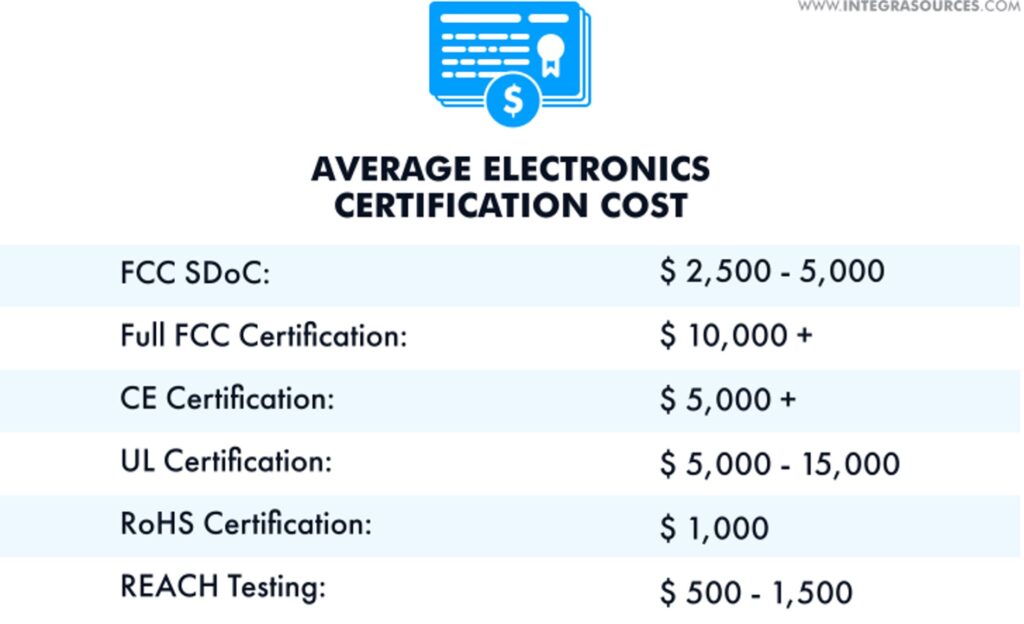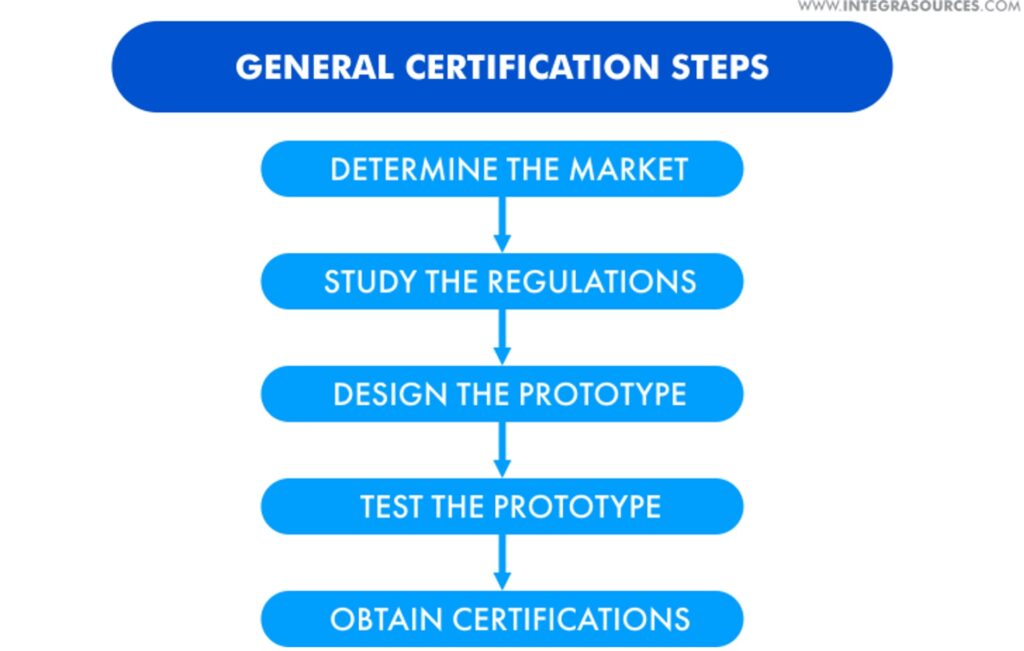As a rule, companies cannot market and sell a consumer electronics product right after manufacturing it, as such devices require various certifications. Government regulations are aimed at ensuring that goods entering markets are safe for consumers. In the case of electrical devices, governments also require that they don’t interfere with other equipment and wireless communication infrastructure.
In this article, we will discuss the most common certification types and testing methods required to sell consumer electronics in the United States and European Union.
What Goods Need to be Certified?
Mandatory certification is applied to a very wide range of electrical devices, equipment, and components.
Nevertheless, consumer electronics that require certification can be divided into two large categories: unintentional and intentional radiators. Unintentional radiators are not supposed to generate RF waves but produce them as a by-product. Computers and electric motors are typical examples. Intentional radiators generate RF waves as a part of their primary function; therefore, the requirements for such devices are much stricter compared to the first category.
Common Certifications Required in US and EU
FCC Certification
The Federal Communications Commission (FCC) ensures that electrical devices do not interfere with wireless communication and falls under the 15th section of title 47 of the Code of Federal Regulations. Generally speaking, all devices that oscillate at 9 kHz or higher must go through FCC certification to be approved for the US market.
Unintentional radiators require a Supplier’s Declaration of Conformity (SDoC), which can be self-issued if the company obtains the required test reports from a credible testing lab and is located in the US. Companies from outside the US have to hire a local representative.
Intentional radiators must go through the full FCC certification procedure, which requires hiring an FCC-accredited lab. The certificate can be issued only by an FCC-recognized telecommunication certification body (TCB).
CE Certification
CE (Conformité Européenne) is the European equivalent of FCC, which ensures that new products entering the market are safe for health and the environment. Although slightly different, FCC and CE have many similar requirements.
New products must comply with a variety of regulations (called CE directives). Note that the same product can be regulated by more than one directive. Certain directives allow manufacturers and importers to carry out the required tests with their in-house facilities. But some goods, such as medical devices and protective equipment, require the goods to be tested and certified by conformity assessment bodies (notified bodies).
UL Certification
Underwriters Laboratories is a private certification company whose primary concern is the safety of products. UL certification is not mandatory in the US; however, most retailers will refuse to buy goods that were not tested and certified by UL.
UL official laboratories are located in many regions, including Europe and North America, and can be easily found on UL’s website.
RoHS Certification
RoHS stands for Restriction of Hazardous Substances and is required in the EU as well as California (which is the largest market within the US). By obtaining this certification, manufacturers prove that their electronic products do not contain hazardous materials (such as lead) in quantities exceeding the established thresholds.
RoHS certificates can be self-issued if the companies can carry out the required tests on their own. Otherwise, manufacturers and importers can hire a third-party laboratory.
REACH Certification
Registration, Evaluation, Authorization and Restriction of Chemicals is similar to RoHS, as it also regulates the content of hazardous chemicals in products entering the EU market. REACH is commonly required for such goods as jewelry, clothes, and furniture, but since electronics and PCBs often contain lead and other potentially hazardous chemicals in small quantities, they also need to be certified.
Third-party laboratories can perform the required tests and issue the test reports, which can be requested by national market surveillance authorities of any EU country.
Certification Costs
The total cost of product certification depends on the complexity of the device to be certified and the number of tests required. However, failing to certify a device at the first attempt (which is not uncommon) will require certain changes in the product design and new tests, which will make certification even more expensive.
On average, manufacturers, importers, and sellers should expect the following charges:
Commonly Required Testing Methods
Although different certificates can require various tests (depending on what product type needs to be certified), consumer electronics usually require the following testing methods.
- EMC (Electromagnetic Compatibility) Test
EMC testing is required to prove that an electrical device doesn’t cause electromagnetic interference effects on other devices when it performs its basic functions. Additionally, EMC tests are carried out to make sure the equipment is resistant to electrical fast transients, electrostatic discharges, and lighting strikes.
- ESD (Electrostatic Discharge) Immunity Test
Since electronic components can be easily damaged by electrostatic discharges, manufacturers have to prove their products are immune to ESD. That’s why this subtype of EMC testing is often required for consumer electronics certification.
- CE RED Testing
The Radio Equipment Directive (RED) is one of the CE regulations applied to intentional radiators. Such products as TVs, smartphones, Bluetooth and Wi-Fi devices commonly need to pass this test to obtain CE certification.
General Steps for Successful Electronics Certification
- Determining the market. Companies should begin with deciding which market they wish to enter and, therefore, which regulations their goods must comply with.
- Determining the regulations. Next, companies must find out which type of product their device falls into and, therefore, which directives or regulations are applied. It is crucial to understand the requirements for the product before designing a prototype to make sure one won’t have to make costly changes afterward.
- Designing the product. Although products rarely obtain certifications at the first attempt, keeping the certification requirements in mind during this phase will help companies avoid significant changes in the future.
- Testing. Next, companies need to hire third-party laboratories or carry out the necessary tests on their own.
- Certification. Lastly, companies must submit the documentation to corresponding authorities to obtain the desired certificate.
Useful Tips on Electronics Certification
- Use pre-certified modules
By using components and modules that were already certified, manufacturers can considerably reduce the cost of product certification or even avoid certification completely.
- Perform internal tests
Another way to reduce the cost of certification is to carry out certain tests during the development process. At this point, one doesn’t need to officially test the device but rather to validate that the prototype complies with the requirements so far.
- Don’t apply for certification too soon
A prototype can differ a lot from the design for assembly. Manufacturers often have to adapt prototypes for mass production, which may require changing the design, using different components or materials, etc. That’s why it is wiser to apply for certification only when you’re ready for mass production.
- Perform a sales test first
It is not a good idea to spend thousands of dollars on certifying a product before making sure it will sell well in a given market. For a sales test, one will only need a few hundred products, which doesn’t require certification in most cases.
Examples of How Developers Should Manage Certification Issues
For a custom hardware developer, it is crucial to be prepared for certification requirements when working on a new project. Here are a few examples of how developers can manage this challenge.
During the development of a USB Keylogger that could record keystrokes typed on a keyboard to protect corporate data, it was decided to use low-power components and mount additional filter capacitors on the USB interface. However, the low-price clock generator that was used in the PCB caused too much electromagnetic interference. To eliminate this problem without using a more expensive component, the generator was protected with additional filter circuits and some components were repositioned. As a result, the device successfully passed CE certification.
Another task was to develop a Wi-Fi control system that could be accessed with a smartphone. In order to be sold in the US, the system had to be UL certified. It was decided to use an FS12-2850-C2 power transformer, as it is hermetically sealed (the system was supposed to work in a humid environment) and features enhanced safety characteristics that comply with the UL 5085-3 standard. UL certified G5LE-1A-E DC5 and G5LE-1A4 DC5 power relays were also used.
Another item (a wearable ECG device) couldn’t pass an ESD test. Thanks to ESD diodes used in the PCB the device could survive electrostatic discharges, but the system would malfunction due to voltage fluctuations in the microcontroller power supply, requiring a manual reset. Presumably, this problem can be solved by using a watchdog timer and updating the firmware, as the timer would automatically reset the microcontroller, instantly restoring the nominal operation mode.
List of Testing Laboratories and Certification Consulting Companies
FCC Consulting Companies
Such firms help companies assess standards, draft SDoCs, test products, provide on-site diagnostics, create technical files, register and license devices, etc. Here are some of the leading consulting companies in this area:
- Sanders RF Consulting (radio frequency devices)
- FCC Consulting Services (radio frequency devices)
- iCertifi (wireless, telecom and RFID devices, household appliances)
- Testing Partners (consumer and industrial products)
- CSIA (radio frequency devices, electronic goods)
CE Marking Service Firms
Such companies specialize in product evaluation, creating documents for CE certification, booking laboratories for tests, and can also provide CE Marking training.
- Conformance
- CE Marking Association
- TÜV Rheinland
- SGS
- Element
UL Testing Companies
While a product can be tested by Underwriters Laboratories, companies can also hire third-party labs to check if the device complies with UL standards.
- SGS (household appliances, lightings, batteries, IT equipment)
- Intertek (household appliances, solar products)
- Eurofins (household appliances, telecom equipment)
- TÜV SÜD (household and commercial appliances)
- F2 Labs (household appliances, lighting, IT equipment)
RoHS Testing Companies
Some firms mentioned above also offer RoHS testing services, including consulting, testing, technical file creation, and certification.
- Intertek
- SGS
- QIMA
- TÜV Rheinland
- CMA Testing
REACH Testing Firms
And finally, these companies will help you comply with REACH requirements.
- B-Land Consulting (consumer products, chemicals)
- Reach Chemconsult (consumer products, cosmetics, biocides)
- Enviropass Expertise (electronics, household appliances, batteries)
- TSG (consumer and industrial products, medical goods)
Considering the range of standards and mandatory requirements consumer electronics must comply with, it is not surprising products rarely pass certification at the first attempt. Nevertheless, taking these requirements into account before mass production can substantially reduce the cost of product development and certification.
At Integra Sources, we know about these and other electronics certification challenges and design electronic equipment with corresponding regulations in mind, thus, making it easier for customers to introduce new goods to the market.
Integra Sources is one of the experts in custom software development and hardware design. Read the article on consumer electronics certification in the US and EU in the company’s blog to learn more about how to certify electronic devices.



